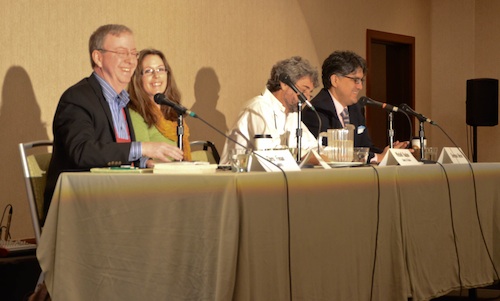YA Authors Address Free Expression Issues
 Monday’s Winter Institute session entitled “Banned Books, Censorship, and YA Literature” fostered a lively discussion about booksellers’ roles when communities face censorship issues.
Monday’s Winter Institute session entitled “Banned Books, Censorship, and YA Literature” fostered a lively discussion about booksellers’ roles when communities face censorship issues.
Moderated by Chris Finan, president of the American Booksellers Foundation for Free Expression, the panel featured Sherman Alexie, author of frequently banned The Absolutely True Diary of a Part-Time Indian; Laurie Halse Anderson, whose books Speak and Twisted have faced many challenges; and Mitchell Kaplan, the owner of Books & Books in Coral Gables, Florida, and an ABFFE Board member, who has made strides in countering would-be censors in his community.
Finan began by telling the audience of 100-plus booksellers that 326 books were banned in 2011. “That’s a lot of books that kids aren’t reading,” he said. “We have a book censorship problem in this country.”
Finan then cited Meghan Cox-Gurdon’s much-debated Wall Street Journal article, “Darkness Too Visible,” that both condemns teen literature as a whole for its “hideously distorted portrayals of what life is” and claims that those who fight censorship don’t care about kids.
Anderson told the audience that she believes most challenges come from good-hearted people. “When I see censorship attacks, I see adults who are absolutely terrified,” she said. “Not only for their child, because the world’s a big scary place, but because they’re afraid because they don’t know how to talk about these things.”
It’s easier, said Anderson, to demonize an entire genre of literature. “I have a fair amount of patience with these people, because if you have a conversation with them, sometimes you can make gains.”
On the other hand, the people with whom Anderson said she has no patience are the political people. “And by political, I mean religious,” she said, those who want to take over the country by manipulating people who have understandable anxieties about their children, those who want to take over school boards and dictate the agenda of what is American.
“And those sons of bitches need to go,” Anderson said.
In addressing the issue of how he responds to critiques suggesting that YA books normalize aberrant behavior, Alexie admitted that he is happy to know that books remain a danger to some people.
“In this age of complete cultural free-for-all on the Internet, the idea that something as old fashioned and primitive as dead trees with ink on them can be dangerous is heartening... but I’m not nearly as diplomatic as Laurie is.”
Alexie explained that he has found that his book banners are “almost exclusively white Christian conservatives,” who are “not so much trying to ban subject matter as they’re trying to ban liberalism.”
It’s also often the case that people haven’t read a book before trying to censor it, he said, so the attempt is based on innuendo, myth, and rumor. “That was the first step of the Salem witch trials,” said Alexie.
Kaplan stressed that it’s important to fight the people that have political agendas. “That could affect us all if the dialogue gets to a point where we have state-sponsored censorship,” he said.
Kaplan explained that he uses censorship attempts as opportunities to educate, to assure parents that it’s okay for kids to hear something that allows them to explore the margins.
“That’s what you’re supposed to do as a kid,” he said. “You want to be able to read things that relate to you.”
To parents who argue that in censoring a book they are simply exercising their right to decide what their child will or won’t read, Alexie says that not reading the book is always an option.
“I have no quarrel with parents who don’t want their kids to read a book,” he said. “But they try to control what every kid reads and what gets published.”
Anderson shared a story about visiting Qatar, where she spoke to many veiled Muslim and Mormon women about the importance of teens having access to YA literature. By the end of the discussion, one woman revealed teary eyes and admitted that she thought she was keeping her children safe by not telling them these things, when in reality she was opening the door for them to get hurt.
“That was such a meaningful moment for me,” said Anderson, “to watch a grown woman who had strong convictions, when walking through the door, about her role as a mother and what she felt was moral and amoral, and that she had the grace to listen and to grow a little bit. When you have opportunities to have these conversations in your communities, you will open some hearts.”
Kaplan said that fear can be extremely debilitating. “There’s nothing to fear about stories. When you do take a stand, there are a million natural allies that you didn’t realize were allies.” Among the things that booksellers can do, said Kaplan, are support the Kids Right to Read Project and find ways to promote Banned Books Week in their stores.